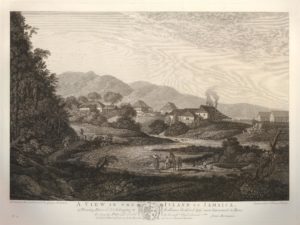In this article Professor Trevor Burnard, a section editor for Empire to 1783 at the Bibliography of British and Irish History (BBIH), Wilberforce Professor of Slavery and Emancipation at the University of Hull, and Director of the Wilberforce Institute reflects on the changing historiography of the British Empire and imperialism from 2003-2022.
By Trevor Burnard
It might be thought that the British Empire and imperialism as a topic of historical inquiry have always been subjects of great fascination for scholars and students of British history. Britain was an imperial nation from the early seventeenth century, with settlement in Jamestown, Virginia, in 1607. By the eighteenth-century, as Britain embarked upon a series of generally successful wars against France for who controlled the New World and South Asia (the American Revolution being the major exception to continued British imperial success), matters imperial were discussed in virtually every issue of the newspapers that proliferated in the nation and imperial plans for central to the geopolitics of Britain’s quest to become powerful in the world. In the nineteenth century, of course, British global power was signified by the many places of the map that were marked `red’ as belonging to the British nation. Imperialism continued into the twentieth century with both world wars being, as Richard Overy argues for World War II, imperial conflicts.
Nevertheless, the practice of imperial history by professional historians has ebbed and flowed in importance and significance over time, according to fashion and to contemporary politics. As little as a generation ago, imperial history was decidedly out of fashion. Indeed, as Pat Griffin, a leading historian of the American Revolution, noted in an appreciation of the most important mid-twentieth century imperial historian of early America, Lawrence Henry Gipson (1880-1971), whose magnum opus was a massive fifteen-volume history of the British Empire in the Americas before the American Revolution, imperialism was effectively a left-behind approach to history when Gipson finished writing imperial history in the 1960s. When Gipson died in 1971, his approach, marked by an indifference to history from below, an incessant and occasionally grating Anglophilia at odds with a more diverse America, and his deliberately pedestrian prose (chosen out of distaste for the florid over-romanticism of a generation of amateur historians writing at the turn of the twentieth century) was out of step with a Vietnam-era world of decolonization and anti-imperialism. Ironically, perhaps, Griffin wrote this review of Gipson and the end of imperial history in 2003, the year that I began as section editor for the BBIH Empire and the Commonwealth before 1783 bibliography.

© The Trustees of the British Museum
View of Fort William estate belonging to William Beckford near Savannah la Marr, with river in foreground crossed by bridge with figures driving donkeys at right, buildings beyond and a house nestled in hillside in background; no. 3 from a series. 1778 Etching and engraving
The same derision towards imperialism was less apparent in British historiography of the 1970s and 1980s but it was still there. It was Europe that was the thing to concentrate upon, after Britain joined the European Economic Community in 1974. The New Zealand historian, J.G.A. Pocock, lamented how `within very recent memory the English have been increasingly willing to declare that neither empire nor commonwealth ever meant much in their consciousness that they were Europeans all the time.’[1] Pocock’s former colleague in New Zealand, D.K. Fieldhouse, then at Cambridge, was even more despondent about the future of imperial history at this time. He expressed despair over the fragmented state of the field, imploring, “can the fragments of the old history be put together again into new patterns which are intellectually respectable?” He feared that imperial history might be “condemned to share the midden of discredited academic subjects with, say, astrology or phrenology.”[2]
We can start to see changes developing in an article by Fieldhouse’s successor at Cambridge, A.G. Hopkins, in 1999. Hopkins thought that imperial history had a future and that it was all that more important as discourses of globalization were taking hold. He proclaimed that “what is needed is a fundamental reappraisal of world history to bring out the extent to which, in recent centuries, it has been shaped by the interaction of several types of empire at various stages of development and decay.”[3] The most significant historiographical event which transformed the study of imperialism was the five-volume survey of British imperialism in the Oxford History of the British Empire, published in the late 1990s. The OHBE was a watershed moment, providing an agenda for historical investigation into empire, even if its defiantly anti-post-colonialist stance was off-putting to those more sympathetic to postcolonialism and to a “new imperial history” based around explorations of difference.
What united traditional imperial historians and “new” imperial historians was a belief that imperialism was so wide-ranging as to encompass the whole of eighteenth-century British and British American history. It was about culture as much as power. As Eric Hinderaker wrote in 1996, “empire is a cultural artifact as well as a geopolitical entity; it belongs to a geography of the mind as well as a geography of power.”[4] And as Kathleen Wilson argues, “the eighteenth-century British empire presents us with interconnected and interdependent sites of historical importance, territorial and imaginative, that can disrupt oppositions between metropole and colony and allow us to rethink the genealogies and historiographies of national belonging and exclusion.”[5]
Studies of empire have abounded since the 2000s because they meet significant parts of the twenty-first century zeitgeist, at least that zeitgeist which existed before the rise of populist nationalism in China, America and much of Europe after 2015. Historical imperialism is an interesting topic in an age of transnational globalization when the borders separating countries and economies seemed porous (a reality that in the Covid era has rapidly disappeared). Imperial history also answered questions about the past which bore on the present – notably the cultural history questions of identity and difference – in ways that histories of nation-states were less able to do. Krisnan Kumar explains that “empires, for all their faults, show us another way, a way of managing diversity and differences that are now the inescapable fate of practically all so-called nation-states.” “That by itself,” he argues, “seems sufficient grounds for continuing to study them, and to reflect on what they might be able to teach us.” The study of empires engages current beliefs in multiculturalism, diasporas, migrations and multinationalism and can be a prism through which the “pressing problems of the contemporary world and even the birth pangs of a new world order” can be addressed.[6]
The BBIH has many works that contribute to this renewed sense that imperialism is important. There are 46,856 entries on empire and the commonwealth, about 16,000 or so which deal with the period when British North America was part of a British Empire. Works on the West Indies, on British India, and Africa are less abundant but are increasing in numbers. Reading the most recent entries confirms that there has indeed been an `imperial turn” in British historiography with empire considered vital to understanding the British past as much as its present, and perhaps its future. The study of imperialism and its legacies in the period before 1783 is in rude good health as I give up being section editor for this period in 2022, in considerable contrast to where it was when I started as section editor in 2003.
[1] J.G.A. Pocock, “British History: A Plea for a New Subject,” Journal of Modern History 47 (1975), 601-21.
[2] D.K. Fieldhouse, “Can Humpty-Dumpty be put together again: imperial history in the 1980s,” Journal of Imperial and Commonwealth History 12 (1984), 9-23.
[3] A.G. Hopkins, “Back to the Future: From National History to Imperial History,” S&A 164 (1999), 198-243.
[4] Eric Hinderaker, “The `Four Indian Kings’ and the Imaginative Construction of the British Empire,” WMQ 53 (1996), 486.
[5] Kathleen Wilson, “Introduction; histories, empires, modernities,” in idem, A New Imperial History: Culture, Identity and Modernity in Britain and the Empire 1660-1840 (Cambridge: Cambridge University Press, 2004), 3.
[6] Krishnan Kumar, Visions of Empire: How Five Imperial Regimes Shaped the World (Princeton: Princeton University Press, 2017), 3, 475.


